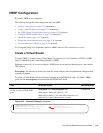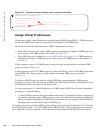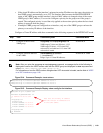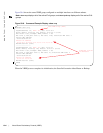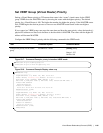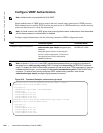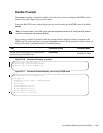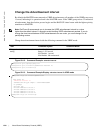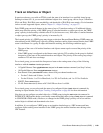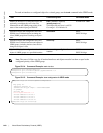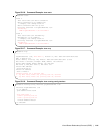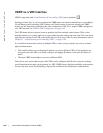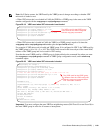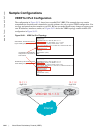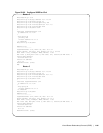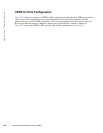Virtual Router Redundancy Protocol (VRRP) | 1139
Track an Interface or Object
In previous releases, you could set FTOS to track the state of an interface for a specified virtual group.
Starting in release 8.4.1.0, you can track additional objects for a virtual group, such as Layer 3 interfaces
(IPv4 and IPv6), IPv4/IPv6 route reachability, and thresholds of IPv4/IPv6 route metrics. For information
on how to track supported objects, refer to Chapter 31, “Object Tracking,” on page 677.
Each VRRP group can track changes in the status of up to 12 interfaces and up to 20 additional objects,
which may affect the priority of the VRRP group. If a tracked interface or object goes down, the VRRP
group’s priority is decreased by a default value of 10 (also known as cost). If the state of a tracked interface
or object goes up, the VRRP group’s priority is increased by 10.
The lowered priority of a VRRP group may trigger an election. Because Master/Backup VRRP routers are
selected based on the VRRP group’s priority, tracking interfaces and/or objects ensures that the best VRRP
router is the Master for a group. In object and interface tracking, the following conditions apply:
• The sum of the costs of all tracked interfaces and objects cannot equal or exceed the priority of the
VRRP group.
• If the VRRP group is configured as the Owner router (priority 255), tracking for the group is disabled,
irrespective of the state of the tracked interfaces and objects. The priority of the owner group always
remains as 255 and does not change.
For a virtual group, you can track the line-protocol state or the routing status of any of the following
interfaces with the
interface interface parameter:
• 1-Gigabit Ethernet: Enter
gigabitethernet slot/port in the track interface command (see Step 1 below).
• 10-Gigabit Ethernet: Enter
tengigabitethernet slot/port.
• Port channel: Enter
port-channel number, where valid port-channel numbers are:
• For the C-Series and S-Series, 1 to 128
• For the E-Series: 1 to 32 for EtherScale, 1 to 255 for TeraScale, and 1 to 512 for ExaScale
• SONET: Enter
sonet slot/port.
• VLAN: Enter
vlan vlan-id, where valid VLAN IDs are from 1 to 4094.
For a virtual group, you can also track the status of a configured object (
track object-id command) by
entering its object number. See Object Tracking Configuration on page 681 for more information.
Note that you can configure a tracked object for a VRRP group (using the
track object-id command in
INTERFACE-VRID mode) before you actually create the tracked object (using a
track object-id command
in CONFIGURATION mode). However, no changes in the VRRP group’s priority will occur until the
tracked object is defined and determined to be down.
In addition, if you configure a VRRP group on an interface that belongs to a VRF instance and later
configure object tracking on an interface for the VRRP group, the tracked interface must belong to the
VRF instance.



